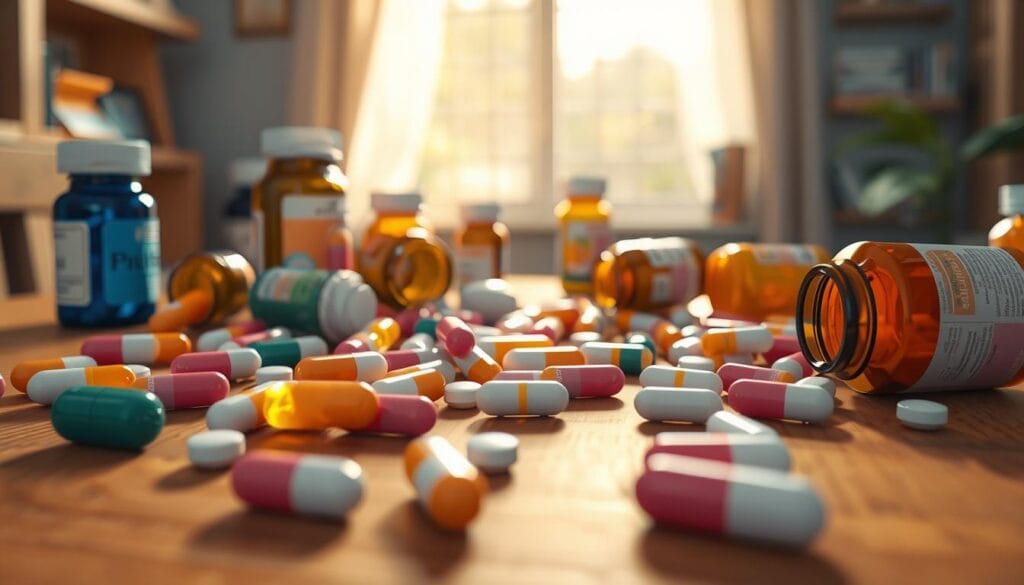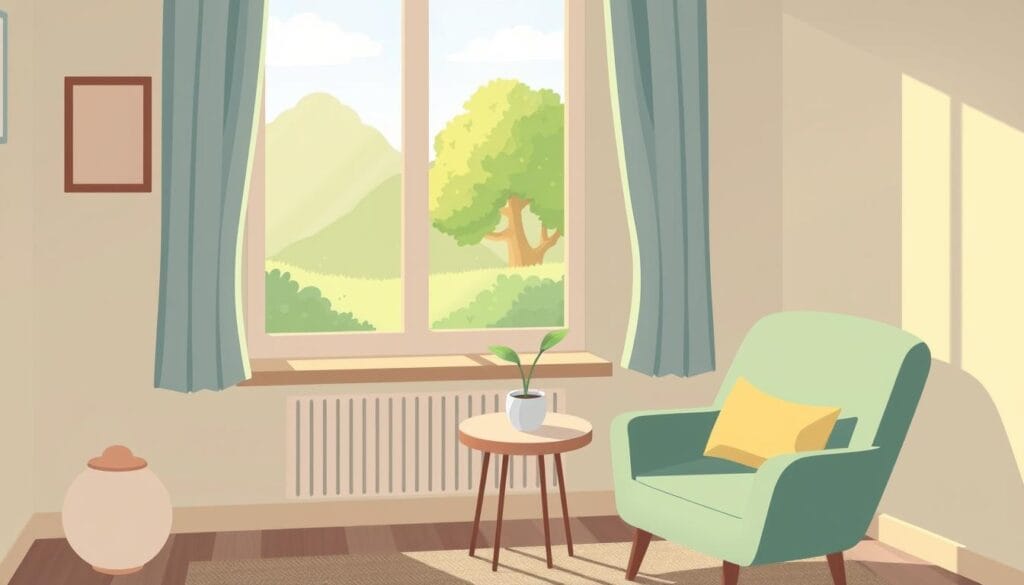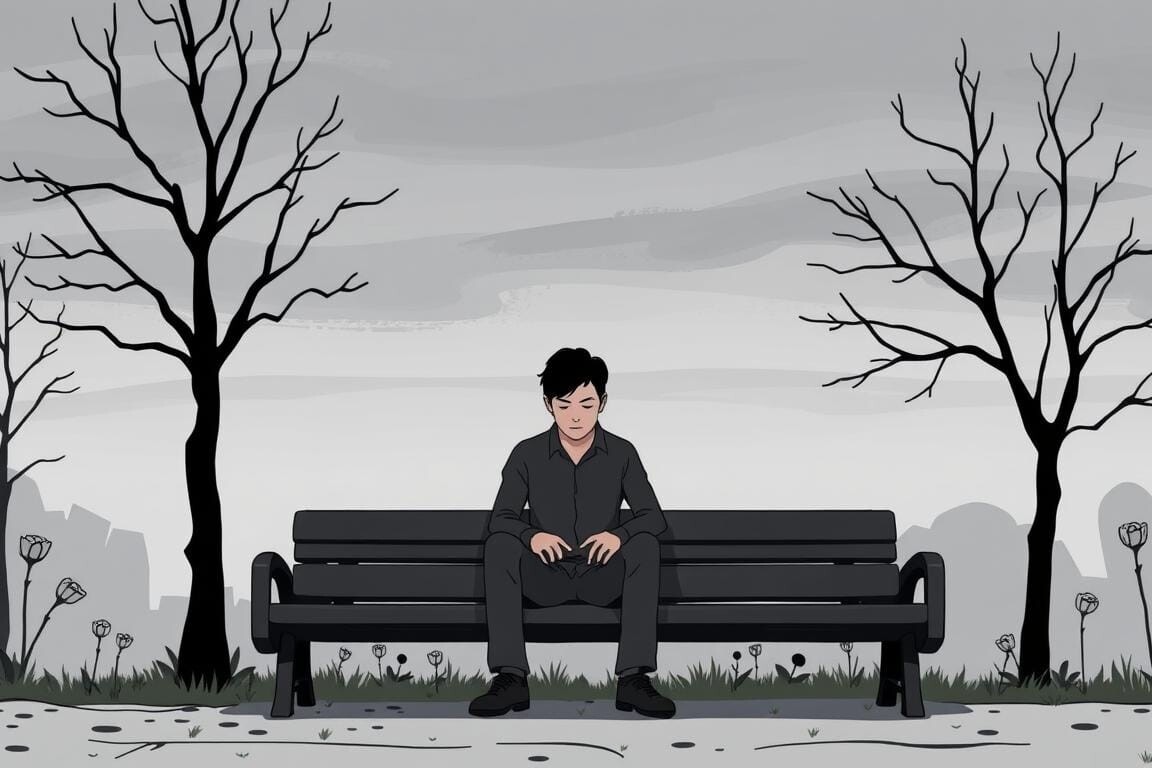Depression is a silent battle that millions face every day. It affects their well-being and daily life. While treatable, social stigma and lack of resources often lead to it being ignored.
This article will look at treatment options for depression. We’ll focus on interpersonal therapy, guided by Dr. Chandril Chugh, a top mental health expert in the U.S.
Interpersonal therapy for depression helps improve communication and address relationship issues. It also teaches healthier ways to cope. By focusing on social and interpersonal aspects, it aims to reduce depression symptoms and improve mental health.
Dr. Chandril Chugh uses this therapy to help patients deal with depression. He helps them regain their quality of life.
Table of Contents
ToggleUnderstanding Depression: A Silent Battle
Depression is more than feeling sad. It’s a serious mental health issue that can ruin your life. It’s a quiet fight that millions face in the United States, with depression becoming more common.
The World Health Organization says depression affects over 264 million people worldwide. In the United States, about 21 million adults had a major depressive episode in 2020. This is 8.4% of the population.
Depression symptoms vary but often include sleep and appetite changes. You might also feel hopeless, guilty, or have physical pain. These feelings last more than two weeks and really hurt your life quality.
Many things can cause depression, like trauma, genetics, and brain changes. Knowing about depression’s symptoms and causes is the first step to getting help.
It’s important to understand depression to fight it well. Learning about depression’s impact, symptoms, and causes helps us seek help. This way, we can break the silence and win the fight against depression.
Does Everyone with Depression Need Treatment?
Deciding to get treatment for depression isn’t the same for everyone. Some people need help right away because their symptoms are very bad. Others might not need medication if their depression is mild. It’s important to figure out how bad your symptoms are and talk to a doctor to find the right treatment.
Evaluating the Severity of Your Symptoms
It’s key to know how bad your depression symptoms are. If you have mild depression, you might not need medicine. You could try changing your lifestyle or talking to a therapist instead. But, if your doctor thinks you might get worse, listen to their advice.
- Mild depression symptoms might make you feel sad or tired sometimes. They don’t stop you from doing your daily stuff.
- Moderate depression symptoms can really mess up your life. They can affect your job, friends, and how you feel overall.
- Severe depression symptoms are very hard to deal with. They can make even simple tasks hard. This kind of depression usually needs a big treatment plan, including medicine and therapy.
Knowing how bad your depression is helps you and your doctor find the best treatment. It could be medicine, therapy, or both. The main goal is to find what works best for you and helps you feel better mentally.
The Importance of a Support System
Having a strong support system is key when dealing with depression, whether you’re taking medication or not. This network can include family, friends, or others who have battled depression. Talking openly and staying connected can greatly help manage symptoms.
Depression is not a sign of weakness. It can hit anyone. Interpersonal Therapy (IPT) focuses on how we connect and communicate. It aims to improve our mental health by fixing issues in our relationships.
IPT works well for many, including teens and the elderly. It’s a 12–20 session therapy that lasts 4–5 months. It’s designed to tackle depression head-on.
Surrounding yourself with a supportive group can help you get through tough times. Whether it’s family, friends, or mental health experts, having people who care can make a big difference. They offer emotional and practical support.
You don’t have to face depression by yourself. Talk to your support group, stay connected, and seek help when needed. With their help, you can beat depression and improve your mental health.
Medication Options for Treating Depression
Medication is key in managing depression. It helps balance your mental health. There are many antidepressants and other meds, each with its own benefits. Knowing these options helps you find the right treatment with your doctor.
Antidepressants and Their Mechanisms
Antidepressants work by changing how neurotransmitters work in the brain. These chemicals, like serotonin and dopamine, help control mood. When they’re out of balance, depression can happen.
- Selective Serotonin Reuptake Inhibitors (SSRIs) like Citalopram, Escitalopram, Fluoxetine, and Sertraline increase serotonin.
- Serotonin-Norepinephrine Reuptake Inhibitors (SNRIs) such as Duloxetine, Venlafaxine, and Desvenlafaxine boost serotonin and norepinephrine.
- Tricyclic antidepressants, including Imipramine and Nortriptyline, also affect serotonin and norepinephrine, but have more side effects.
- Monoamine Oxidase Inhibitors (MAOIs) like Tranylcypromine and Phenelzine are used when other meds don’t work.
Doctors might mix antidepressants with other meds for better results. Genetic tests can show how you’ll react to certain antidepressants.

Remember, the FDA warns about a higher risk of suicidal thoughts in kids and teens with antidepressants. Your doctor will watch you closely at first.
Non-Medication Therapies for Depression
Managing depression doesn’t always mean taking medication. There are many non-medication therapies that work well. These therapies help change negative thoughts and improve how we cope with life.
Cognitive-behavioral therapy (CBT) is a well-known therapy for depression. It helps people see how their thoughts, feelings, and actions are connected. This way, they can better manage their symptoms. Dialectical behavior therapy (DBT) also helps by teaching skills like mindfulness and emotion control.
Interpersonal therapy (IPT) focuses on how our relationships affect our mood. It helps people improve their communication and build stronger support systems. This therapy is great for dealing with tough life changes.
These therapies can be very helpful, and might be used alone or with medication. If you’re dealing with depression, talk to your doctor about these options. They can help you find the best way to feel better.
Lifestyle Changes for Improved Mental Health
Managing depression can be helped by making lifestyle changes. Healthy habits in your daily life can boost your mental health. They work well with other treatments.
Incorporating Healthy Habits
Exercise, a balanced diet, and enough sleep are key for a healthy life. They help your mental health a lot. Studies show that good food and exercise can lower depression risk.
Deep breathing, meditation, or mindfulness can also help. They reduce stress and help you relax. Adding these to your self-care can be very helpful.
- Aim for at least 150 minutes of moderate-intensity physical activity and two days of muscle-strengthening activities per week, as recommended by the CDC.
- Prioritize a balanced diet that limits high sugar intake, as research has linked excessive sugar consumption to higher rates of depression.
- Establish a consistent sleep routine, as sleep problems are often an early sign of depression.
- Incorporate stress-reduction practices, such as deep breathing, meditation, or mindfulness, into your daily life.

By changing your lifestyle, you can improve your mental health. These changes can help with other treatments. Remember, small steps can lead to big improvements in your mental well-being.
Seeking Social Support and Self-Care
In your journey towards mental health recovery, seeking social support and prioritizing self-care is key. Research shows that social support protects mental health. It’s vital for recovering from depression and mood disorders.
Building a supportive network with family and friends is important. It gives you a sense of belonging and emotional support. Doing things that make you feel good, like exercise or hobbies, helps fight depression. It gives you purpose and control.
Here are ways to add social support and self-care to your recovery:
- Reach out to trusted loved ones and share your experiences. Lean on them for emotional support and practical help.
- Join a support group, either in-person or online, to connect with others who understand you.
- Do things that bring you joy and a sense of accomplishment, like reading or gardening.
- Try relaxation techniques, such as deep breathing or yoga, to manage stress and improve well-being.
- Make self-care a priority, like getting enough sleep, eating well, and exercising regularly, for your mental and physical health.
By seeking social support and practicing self-care, you empower yourself on the path to mental health recovery. You find the strength to overcome depression’s challenges.
Interpersonal Therapy for Depression: How It Works
If you’re dealing with depression, IPT can help. It focuses on improving your relationships and how you talk to others. This can really change how you feel and live.
IPT helps you find and fix problems in your relationships. It teaches you how to have better relationships and ways to deal with tough times.
You’ll have 12 to 16 sessions of IPT. You can do it alone or with others, in person or online. The main part of IPT lasts 12–16 weeks. It’s best used when you’re first getting treatment for depression.
But IPT can also help keep you from getting depressed again. It’s good for many mental health issues.
With IPT, you and your therapist will look at how your relationships and life changes affect your mind. They’ll teach you to talk better, deal with feelings of loss, and solve problems in your relationships. Studies show IPT works as well as CBT for depression. It can also help with eating disorders and anxiety.
At times, IPT and medicine together work better than either one alone. You might need to see your therapist more often if you have a long-term condition. IPT is for people of all ages, from teens to seniors. It’s a flexible way to tackle depression at any stage of life.
If you want to try interpersonal therapy for depression, talk to your doctor. They can see if it’s right for you and guide you on what to do next.

The Role of Dr. Chandril Chugh
Dr. Chandril Chugh is a top mental health expert. He helps people find effective treatments for depression. He has over 16 years of experience and focuses on each patient’s needs.
Dr. Chugh is known for his knowledge in mental health, especially depression. He cares deeply for his patients. He makes sure they get the help they need to get better.
He uses many treatments for depression, like medicine and therapy. He also helps with lifestyle changes. This keeps his treatments up-to-date and effective.
Working with Dr. Chugh means getting a caring and personal experience. He listens to each patient’s concerns. This helps them feel empowered and leads to better results.
If you’re dealing with depression, Dr. Chugh can help a lot. His care and knowledge can improve your mental health.
Conclusion
Depression is treatable. With the right help, you can take back control of your mental health. There are many ways to manage symptoms and improve your life.
Interpersonal therapy (IPT) is a proven method. It helps people deal with relationship issues and big life changes. Studies show it can make a big difference in how you feel.
Start by getting professional help and building a support network. Making healthy lifestyle changes can also help. Remember, everyone is different, so it might take some time to find what works for you. But with effort and determination, you can beat depression and feel better.
FAQ
What is depression and how common is it in the United States?
Depression is a deep feeling of hopelessness and sadness. It affects many people of all ages and backgrounds. In the United States, it is one of the most common mental health issues.
Do all individuals with mild depression symptoms require medication?
Not everyone with mild depression needs medicine. The decision to use medication depends on how severe the symptoms are. If a doctor suggests starting medication, it’s important to listen to their advice.
Why is having a strong support system crucial for managing depression?
Talking to others and being around people can help a lot with depression. It can even save lives, especially for those with both depression and anxiety. Having a strong support network is key.
What are the different medication options for the treatment of depression?
There are many medicines for depression, like antidepressants and benzodiazepines. These medicines help by changing how the brain works. They can make more serotonin and epinephrine or stop them from being broken down.
What are some non-medication therapies for the treatment of depression?
Besides medicine, there are other ways to treat depression. Cognitive-behavioral therapy (CBT) and dialectical behavior therapy (DBT) are examples. These therapies help change negative thoughts and improve how you cope with life.
How can lifestyle changes contribute to managing depression?
Changing your lifestyle can also help with depression. Exercise, eating well, sleeping enough, and reducing stress are all important. Adding these healthy habits to your day can help your mental health a lot.
What is interpersonal therapy, and how can it help with depression?
Interpersonal therapy for depression focuses on improving your relationships and how you communicate. It helps you deal with problems in your relationships that might be making you feel sad. This therapy gives you tools for better relationships and coping.
Who is Dr. Chandril Chugh, and what is his expertise in treating depression?
Dr. Chandril Chugh is a top brain expert with lots of medical training in the U.S. He has over 16 years of experience and is known for his caring approach. Dr. Chugh is great at treating mental health issues like depression.
Source Links
About The Author

Medically reviewed by Dr. Chandril Chugh, MD, DM (Neurology)
Board-Certified Neurologist
Dr. Chandril Chugh is a U.S.-trained, board-certified neurologist with expertise in diagnosing and managing neurological disorders, including migraines, epilepsy, Parkinson’s disease, and movement disorders. His clinical focus includes evidence-based neurological care and patient education.
All content is reviewed for medical accuracy and aligned with current neurological guidelines.




